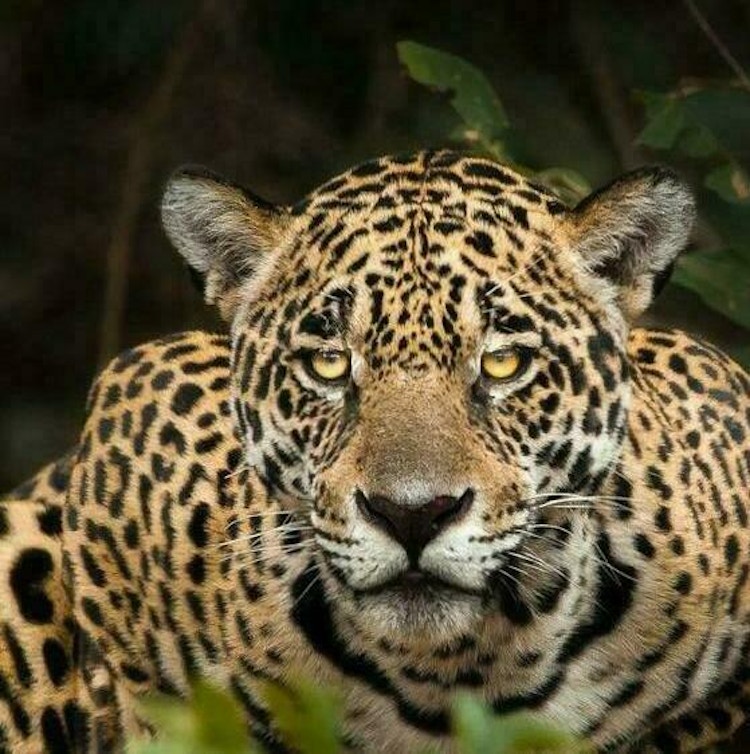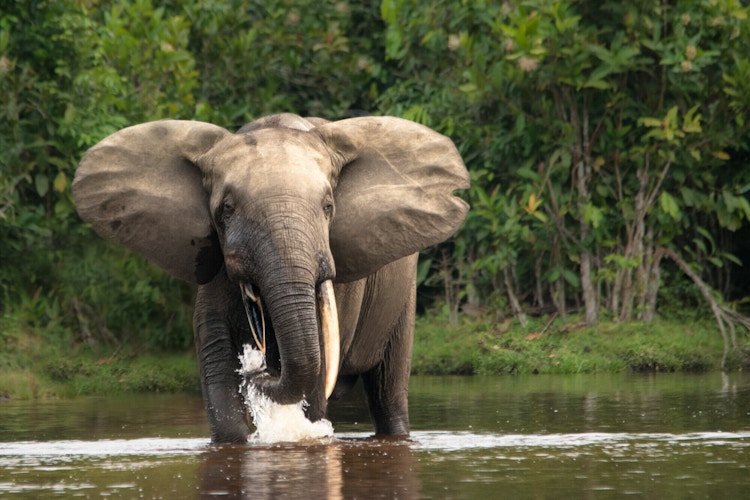
Rainforest Foundation Norway Annual Report 2024
2024 was supposed to be the year we went from words to action. The Global Biodiversity Framework was to be translated into ambitious national plans, and the EU Deforestation Regulation was to be finalised for entry into force. Instead, the year ended in uncertainty, delaying an important decision by a year.
Despite political uncertainty, we’re proud to see significant progress in 2024. Our long-term, trust-based work on the ground with local rainforest guardians has paid off with many milestones and achievements in 2024
Better protection of rainforest areas four times the size of Denmark
Together with our network of Indigenous and local partners, we have secured better protection of 172,000 square kilometres of rainforest by strengthening the rights of Indigenous peoples and securing new or improved management plans. This is an area equal to four times the size of Denmark.
We’ve achieved this through patient and strategic work, often spanning decades, enabling us to deliver results even during political instability.
We’re particularly proud to have helped establish the Mamberamo Foja National Park in Papua, now the second-largest national park in Indonesia. Spanning 17,000 square kilometres, this park is a stellar example of how traditional conservation practices can harmonise with modern environmental governance. We’ve been working towards this result for over a decade with our local partners, including INTSIA.
Another notable milestone is the creation of the Sierra del Divisor Occidental Indigenous reserve in Peru, covering 5,150 square kilometres of untouched tropical rainforest. This reserve protects several isolated Indigenous groups and was established after 19 years of dedicated work by Rainforest Foundation Norway and our Peruvian partners.

INDONESIAN PAPUA: Mamberamo Foja National Park in Papua, the second-largest national park in Indonesia. Photo: INTSIA Papua
Increased funding for Indigenous peoples and local communities.
Together with the Rights and Resources Initiative, we have developed the first open-source dashboard on donor funding for IPs and LCs’ tenure and forest management. Such funding has increased by 36 % in the last four years.
We’ve helped spur this growth by consistently and continuously advocating to Norwegian policymakers for increased funding to Norway’s International Climate and Forests Initiative. RFN has successfully advocated for continuing Norwegian rainforest support at four billion NOK and expanding the commitment of this support to 2035.
RFN has also helped 44 forest communities across all major rainforest countries to secure new sources of financial support or other benefits.
Investors demand better rainforest policies
RFN has also successfully mobilised investors to demand better rainforest policies from the companies in which they invest.
In 2024, we initiated global, collective investor action to remove deforestation-linked nickel from electric car production. Thirty-one investors, representing more than USD 2.7 trillion total assets under management, have signed a declaration that they expect electric car manufacturers to ensure that the nickel suppliers they use are deforestation-free and respect human rights.
As increased demand for key metals for the green transition threatens the rainforest, investor pressure is essential for companies to stop funding rainforest destruction. This initiative was started in collaboration with the Dutch Association of Investors for Sustainable Development.
Rainforest Foundation Norway collaborates closely with over 50 local and national environmental, Indigenous, and human rights organizations in 6 countries in the Amazon region (Brazil, Peru, and Colombia), Central Africa (DR Congo), and Southeast Asia and Oceania (Indonesia and Papua New Guinea). In DR Congo, Rainforest Foundation Norway has a country office.

ISOLATION: The Peruvian Amazon. The rainforest bordering Brazil is home to numerous groups of Indigenous peoples living in voluntary isolation. Photo: Walter Silvera
At a glance: Global policy breakthroughs in 2024
- Secured better protection of 172,000 square kilometres of rainforest, an area equal to four times the size of Denmark.
- Successfully advocated for continuing Norwegian rainforest support at four billion NOK and expanding the commitment of this support to 2035.
- Developed the first open-source dashboard on donor funding for Indigenous Peoples' and Local Communities' tenure and forest management. Such funding has increased by 36 % inthe last four years.
- Thirty-one investors, representing more than USD 2.7 trillion total assets under management, have signed a declaration that they expect electric car manufacturers to ensure that the nickel suppliers they use are deforestation-free and respect human rights.

In Brazil, the fight for sustainable management of the world’s largest rainforest is defined by both progress and setbacks. Although the national government under Lula maintains high ambitions to make Brazil a global environmental leader, an unfavourable Congress and agribusiness-aligned state governments continued to push for dismantling forest protection, rolling back rights for Indigenous peoples and reducing local community management of rainforest areas.
On the ground, the destructive force of climate change grows in strength and ravages both the rainforest biome and the communities living there. Flooding and forest fires in the Brazilian Amazon both reached record-breaking levels in 2024.
In the face of these grave threats, RFNs work to mobilise and strengthen civil society has had a real impact on preserving the Amazon rainforest. Our partners work tirelessly to protect the rainforest at all levels - from training community watchers on how to report and prevent illegal deforestation to making the voice of the rainforest heard in courthouses, political assemblies, investor conferences, meetings and global policy conferences.
Over the course of 2024, we have helped our Brazilian partners to successfully push for increasing the number of Indigenous Territories, develop territorial and Environmental Management Plans, provide invaluable tools and expert advice on national environmental policies, document transgressions towards rainforest communities and ensure the active participation of Indigenous peoples in the international policy arena.

ALERT: A watchful jaguar (Panthera onca) in the Brazilian rainforest. Photo: Araquem Alcantara
Key results from Brazil in 2024:
- Securing 103 553 square kilometres of rainforest areas to shared management structures in Para state, with our partner Iepe.
- Supporting Observatorio de Clima’s work to coordinate the assembling of Indigenous and civil society perspectives into a comprehensive NDC (Nationally Determined Contribution) plan for Brazil, submitted in early 2024.
- Pushing for the successful integration, with partner INESC, of socio-biodiversity measures into the Brazilian Sustainable Taxonomy, laying the groundwork for new investment strategies in Pará and Amapá.
- Helping CPI-Acre expand integrated management to 8 Indigenous Territories in Acre state.

"Working with RFN reminds us that there is someone 'out there' looking after us Indigenous Peoples, and supporting us. This partnership brings strength and visibility to our fight to take care of nature - both in Brazil and in the international arena".
Luciane Mendes, Coordinator of the Department of Socio-Environmental Business, Federation of Indigenous Organizations of Rio Negro (FOIRN), Brazil

"Through ForEco, Rainforest Foundation Norway has incentivised our organisations to work together, to meet and exchange experiences. This way, we strengthen each other. It is a collective gain, and RFN helps our agendas reach spaces beyond Brazil".
Bianca Tozato, Technical Adviser, Instituto Socioambiental (ISA), Brazil

In Peru, a worsening political crisis and weakened institutions led to weakened legislation and forest protection, and violations of human rights and environmental standards. Amendments to the Forestry Law favouring economic interests increased the risk of new concessions to mining, agriculture, oil and logging operations in rainforest areas.
Particularly, we observed a clear lack of state commitment to accelerate and finalise the creation of Indigenous reserves, such as the Yavarí Mirim, for Indigenous people in voluntary isolation and initial contact (PIACIs).
Besides our work with local and Indigenous rainforest communities, a major part of our work in Peru has been focused on countering these risks through legal action. Our partners documented forest crime and its impact through more than 60 national and international media reports. Throughout the year, we also helped our partners present inputs on how to reduce or prosecute forest crime on 29 different occasions.

COLOURFUL: Zimmerman's poison frog (Ranitomeya variabilis) can be found in the Peruvian rainforest. Photo: Dirk Ercken/Shutterstock
Key results from Peru in 2024:
- Establishing the Kandozi people’s integral territory, covering 9559 square kilometres, and improving the management of the Territorial Reserve Madre de Dios, covering 8299 square kilometres, and Alto Purus National Park in Ucayali with 8369 square kilometres.
- With partner DAR, shaping the National Strategy for Biological Diversity by interlinking Indigenous advocacy with biodiversity measures.
- Achieving a landmark victory by successfully halting the operations of 28 logging companies in court through a collaborative effort with ORPIO.

In 2024, our work in the DRC was characterised by relative political stability, persistent institutional gridlock, and ongoing regional insecurity. A fragile institutional and political context, marked by delays in post-electoral governance structures, hindered meaningful progress on policy reform and legislation for forest protection, land tenure, and land use planning. The security situation remained mixed, with relative calm in the west and continued advances of the M23 group in the east, causing large-scale displacement and complicating partners’ work.
Our partners continue to mobilise and provide input within the governmental structure of the DRC. For example, Coalition des Femmes Leaders pour l’Environnement et Développement Durable (CFLEDD) and Groupe d’Action pour Sauver l’Homme et son Environnement (GASHE) provided input ahead of COP29 to the Ministry of Environment and Sustainable Development.
This helped DRC implement its national goals to mobilise increased climate financing for developing countries. Partners also advocated to improve access for national and international organisations to funding from the Central African Forest Initative (CAFI). A CAFI accreditation process for international organisations was agreed upon in the second Letter of Intent signed with DRC’s government, allowing several national organizations, grouped in consortia, to be eligible for funding.

ELEPHANT: African forest elephant (Loxodonta cyclotis) in the Congolese rainforest. Photo: Shutterstock
Key results from DR Congo in 2024:
- Our partner GASHE secured measures by companies in Equateur Province to adopt better practices and avoid deforestation.
- 527 cases reported by trained observers through collaborative initiatives led by GASHE, with recommendations resulting from community consultations translating into action meetings with judicial representatives.

" The partnership with Rainforest Foundation Norway has been a key lever for GASHE in achieving its mission. We have successfully supported local communities and Indigenous peoples to secure their rights and combat deforestation. RFNs technical and financial support has enabled our organisation to expand its activities across the seven territories of Equateur Province in the DRC. RFN is much more than a partner; it is a strategic ally in realising our vision of sustainable and inclusive forest management.”
Julien MATHE, Coordinator, GASHE, DRC

In PNG, 2024 saw increased legal actions against activists, persistent corruption, and ongoing conflicts. The security and governance environment deteriorated, with obstructed civic space, shrinking freedom of expression and rising legal harassment of activists and journalists.
There was a marked surge in Strategic Lawsuits Against Public Participation (SLAPPs) from logging companies: actions to intimidate and silence critics by burdening them with costly and time-consuming litigation. Although this is a worrying trend, it also reflects that our partners’ work to combat illegal and harmful logging is having a real impact.
All the while, RFN and partners have established a degree of collaboration with all major banks operating in PNG, providing information on deforestation risk and helping to develop internal measures to prevent the funding of illegal activities. Furthermore, we saw a growing recognition of forest crime as a serious issue by key national institutions in PNG.

HORNBILL: Blyth's Hornbill (Rhyticeros plicatus) can be found in the forests of the island of New Guinea. Photo: Jan Hasselberg
Key results from Papua New-Guinea in 2024:
- HSBC in Hong Kong introduced measures to identify and delist clients associated with illegal logging in PNG.
- A new multi-agency taskforce was formed to investigate illegal logging, corruption, tax fraud, and money laundering.

In Indonesia, the prevailing political climate of the election and transition from Jokowi’s administration continues to present a challenge for our work. In 2024 civic space came under increased pressure, and partners exercised heightened caution to avoid being perceived as biased towards regional leadership candidates. They also experienced increasing government pressure, intimidation, harassment, and defamation campaigns. Shrinking space for freedom of expression and increasing military involvement require mitigation efforts and strategies to promote human rights, democracy, and justice.
However, our partners continue to do effective work in the face of these obstacles. RFN and partners have made significant progress in strengthening the legal protection of rainforest-adjacent lands while engaging with financers to implement measures preventing unsustainable palm oil production.
Across 2024, our partners drove several successful initiatives spanning legal proposals and implementations, territorial management and community action.

ORANGUTANG: An orangutang (Pongo) mother and her child in the Indonesian rainforest. Photo: Thomas Marent
Key results from Indonesia in 2024:
- The formal recognition of 548 square kilometres of traditional territories of Indigenous Communities (Masyarakat Hukum Adat) in Nunukan, North Kalimantan, Teluk Bintuni, West Papua, and in South Sorong, Southwest Papua
- Successfully pushing for a commitment by the Roundtable on Sustainable Palm Oil (RSPO), through our partner Tansformasi untuk Keadilan Indonesia (TuK) to retaining the Free, Prior, and Informed Consent (FPIC) principle in its latest standards after initially planning to remove it.

“KKI Warsi has been working with RFN for almost three decades—28 years filled with trust and shared purpose. More than just funding, RFN has stood by us in strengthening how we run our programs, manage our finances, and build effective fundraising strategies—support that has been vital to our growth and sustainability as an organization.”
Adi Junedi, Executive Director, KKI WARSI, Indonesia

"Working with RFN has been a powerful reminder for us that advocacy can’t just be reactive—it has to be systemic. RFN has shown a deep commitment to ensuring that the voices and rights of marginalized communities are not only heard but placed at the forefront of state responsibility and restoration.”
Agung Wibowo, Executive Coordinator, Perkumpulan HuMA, Indonesia

On the ground, the Colombian rainforest continues to be threatened by illegal, armed groups in the Colombian Amazon affected partners and their activities, undermining Indigenous governance systems and jeopardising community-based environmental protection across rainforest territories.
Extreme weather conditions with droughts, floods and forest fires increased, exacerbated by climate change and environmental degradation.
However, policies continue to evolve. We saw advances in participatory governance and inclusion of IPs and LCs in Colombia’s evolving climate finance architecture.
Overall, Colombia improved when it came to rights-based rainforest management and land policies protecting the integrity of rainforest ecosystems.

A yellow tree frog (Dendropsophus microcephalus) in the Colombian rainforest with the logo of the UN nature summit COP16, held in Cali, Colombia in 2024. Photo: Thomas Marent
Key results from Colombia in 2024:
- Improving the National Biodiversity Plan for Colombia, through expert advice with partners ONIC and AAS, with new policies for Indigenous people’s protection in Guaviare and acceptance of the Indigenous environmental land planning model (POAI).
- Instigating 15 criminal investigations against illegal loggers, through complaints lodged by partner AAS.

International institutional funding
Rainforest Foundation Norway focused on generating visibility towards prioritized indigenous and local communities-led initiatives at key international arenas including the Amazon Summit in Belém, the New York Climate Week or COP28 in Dubai. This helped further boost funding diversification in 2023 with over 141 million NOK (approximately US$ 13.5 million) of
In 2024, RFN had a total budget of approximately NOK 108 million.
Twenty nine percent of this was sourced from international philanthropic and bilateral institutions: Climate and Land Use Alliance (CLUA) with William + Flora Hewlett and Rainier Climate funds, Bezos Earth Fund, Ford Foundation, CLUA with William and Flora Hewlett Foundation funds, Hans Wilsdorf Foundation, Peter Opsvik Foundation, Rainforest Trust, Sobrato Philanthropies, Wildlife Conservation Society (WCS) with Bezos Earth Fund and Germany’s Federal Ministry for Economic Cooperation and Development, BMZ).
In the same year, Rainforest Fund, Christensen Fund and Ford Foundation confirmed and/or renewed their support to RFN beyond 2024, which validates that RFN’s deliberate funding diversification initiated in 2021 is there to stay.
We achieved this through a continued organizational focus, including the whole organization from financial management to program development, on teasing and articulating viable opportunities to scale up select programmes and result areas. This went hand in hand with an increased effort to position RFN’s large-scale solutions, and their potential for upscaling, as vital contributions to rainforest countries’ international climate and biodiversity commitments.
As an example, we co-hosted two official side events showcasing the Community Fund for Forests (CFF) at COP16, together with the DRC Ministry of Environment and Sustainable Development. These events underlined the importance of community forestry in meeting DRC’s 30 by 30-objectives under the Kunming-Montreal Global Biodiversity Framework. These events further demonstrated the potential of an innovative, IP and LC-led finance mechanism such as CFF to help close the funding gap towards community-led forest concessions (CFCLs) in high integrity areas, while ensuring the local development of communities.
RFN also put its convening power into action. For example, we hosted a Partners and Allies meeting of the Climate Land Use Alliance (CLUA) and Forest People and Climate Initiative (FPC) during the Oslo Tropical Forest Forum, focused on partners and civil society mobilisation towards COP30. And during New York Climate Week, we hosted both closed-door and public events profiling our partners and flagship programmes at the Nature Positive Hub.
Furthermore, having played a key role in bringing the topic of Direct Finance towards IP and LCs with our flagship report “Falling Short”, we continued to push for fit-for-purpose funding and securing ways to enhance direct funding to IP and LCs. To this end, we hosted side events during the New York Climate Week showcasing RFN and RRI’s open-source dashboard for tracking IP and LC funding, and convened discussions with governments, partners and donors on the topic of Direct Finance for IP and LCs during COP16.
Fundraising in Norway (individual and corporate)
In Norway, the combined income from individual and corporate donations totalled NOK 37.9 million in 2024, approximately 12 % of RFN’s total funds at disposal. This included a legacy donation of 4.8 MNOK.
Despite high inflation and a generally negative economic outlook, individual donations remained stable from 2023 to 2024. This result was achieved through continued, varied marketing efforts – content articles, social media activities – aimed at topic of rainforest protection visible for monthly donors (Rainforest Guardians),
We also undertook more sporadic campaigns aimed at larger audience of concerned citizens, encouraging them to take concrete action to protect a global common good by supporting an NGO offering unrivalled potential for climate mitigation.
We also stimulated individual donations through a public petition calling for the continued prioritisation of rainforest protection on the agenda of Norwegian authorities. In the petition, we called on the Norwegian government to make good on its financing commitment under the Kunming-Montreal Global Biodiversity Framework by securing at least 0.1 % of its Gross National Income towards nature aid. Through this campaign, we collected more than 14,000 individual signatures, which were presented to the Norwegian Minister of Environment and Climate at an official signature handover before his participation at COP16.
Conversely, corporate donations saw a decline in 2024. The prime driver of this was a decrease in subscribers to power provider Fortum’s “Grønt Valg” (Green Choice) donation scheme, wherein customers receive renewable energy certificates for the electricity they consume and RFN receives a small donation through every monthly bill. This is likely due to electricity subscriptions being particularly inflation-sensitive, as well as rising costs on Fortum’s side in ensuring stable electricity prices while providing reliable renewable energy certificates.
However, RFN was still entrusted with the support of leading businesses, unions and organizations in Norway, including (not limited to) REMA1000, Det Norske Veritas, Unil, Norgesgruppen, Infinitum, HK Norge, Bergen Live, HELP forsikring, Glittertind, CLP or Bain & Company Norway) Elis, Dyreparken, Cultura Bank and Jörns Resor.